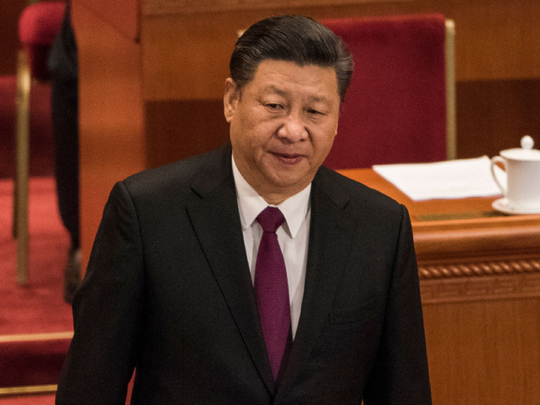
In a democracy, the more personalised a regime is, the more fragile it tends to become. But does this warning also apply to authoritarian regimes? Isn’t China’s “institutional revolution” simply the product of an inevitable evolution that reinforces — as the Chinese would say — a harmonious mix of centralisation, and thus of additional rationality?
It’s clear that contrary to the hopes, or rather the illusions, of many Westerners, capitalist China is not progressing towards “our” model of liberal democracy. It perceives this model as structurally dysfunctional. China now presents itself as an almost perfect form of the absolutist counter-model that draws from its past, now more than ever, to find the keys to its future. It sees no contradictions between digital revolution and imperial restoration, quite the opposite. It is by returning to a form of imperialism that China will regain its rightful place in the international system — the first place, of course.
This spectacular return of China to the world’s economic, strategic, political and henceforth ideological stage is at least as much the product of our involuntary assistance as it is the result of positive efforts made by the Chinese themselves. On four occasions over the past 15 years, the Western world — and especially the United States — has done everything in its power to propel China to its current position.
First, there was the massive strategic error in 2003 of the invasion of Iraq by the United States and some of its allies, most notably Britain. Then came financial and economic recklessness and blindness from 2007 onward, followed by the return of populism in our democratic systems. And now, the spectre of a trade war, which divides and weakens the Western world more than it actually threatens China. Everything is happening as if we were rushing to pass on the torch of history, from our uncertain and wavering hands straight into China’s.
To understand the dramatic change in the course of history — for China, as well as for the world — we must go back to the late 1970s. In the aftermath of Mao Zedong’s death, the establishment of a collective power at China’s helm, at the instigation of Deng Xiaoping, was intended to protect the country from the downward slide of power when such power is held by a single man. The bloody excesses of the Cultural Revolution were dominating the minds of the new leaders.
In 2018, on the contrary, everything is happening as if the priority is to protect the new emperor from the risks of revenge from all those — and there are many of them — who have been the victims of the anti-corruption struggle, which Xi Jinping has led with determination, if not brutality. But by moving away from Deng Xiaoping, and getting closer to Russian President Vladimir Putin, is Xi really giving himself the means to consolidate the Communist Party’s power and China’s influence in the world? Or should we fear the negative long-term impact of this revolution on the future of the party and China as a whole?
Even though the great China has absolutely nothing to do with little Zimbabwe, Robert Mugabe’s recent example is a resounding demonstration that longevity is not necessarily a guarantee of quality, even in autocratic regimes.
As the accumulation of his powers and the mass of his flatterers gradually isolate him from reality, doesn’t any despot inevitably become less and less enlightened over the years — provided he ever was enlightened?
The experience of having all powers concentrated around one man is probably less the product of a Leninist, centralising vision than the consequence of China’s deliberate return to its history.
Beijing is convinced — and rightly so — that, in human history, democracy is the exception and authoritarianism, more or less absolute, the norm. There is no more sense of progress based on a mixture of hope and universalism. The democratic model isn’t universal and it demonstrates its own limitations: “What’s good for you isn’t good for me; and, by the way, is it even really good for you?”
Can those humiliated by the West during the 19th and early 20th centuries fully recover its identity through the sole path of returning to its past and what is the most essential part of Chinese History, its imperial tradition?
The problem is that this fascination with the greatness of absolute power is full of contradictions. Of the 282 emperors who led China in its long history, fewer than half died of natural causes.
Today, largely thanks to US President Donald Trump, China’s image prevails in many countries, including democratic ones, over that of the US. But will China’s soft power be strengthened by this institutional revolution? By becoming commonplace and becoming the Chinese equivalent of what Putin and Erdogan are in Russia and Turkey, doesn’t Xi risk calling into question the Chinese exception at a time when he intends to protect it?
— Worldcrunch 2018/New York Times News Service
Dominique Moisi is senior counsellor at the Institut Montaigne in Paris.










